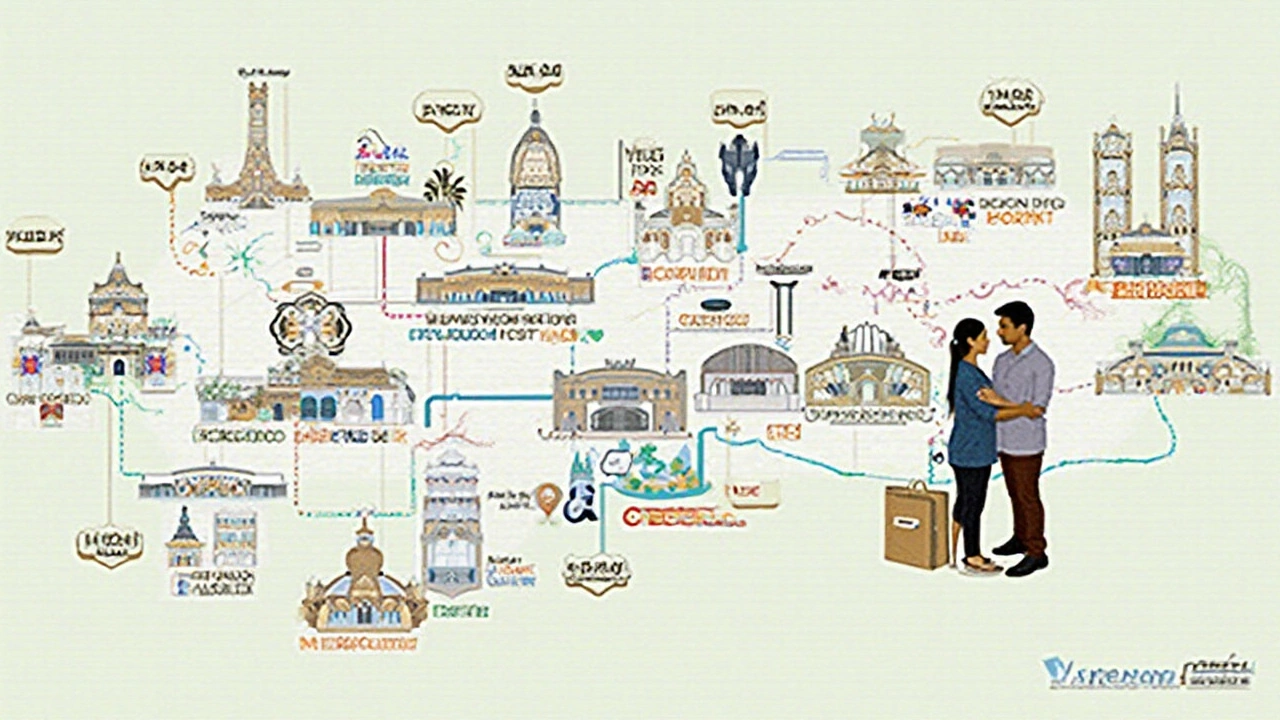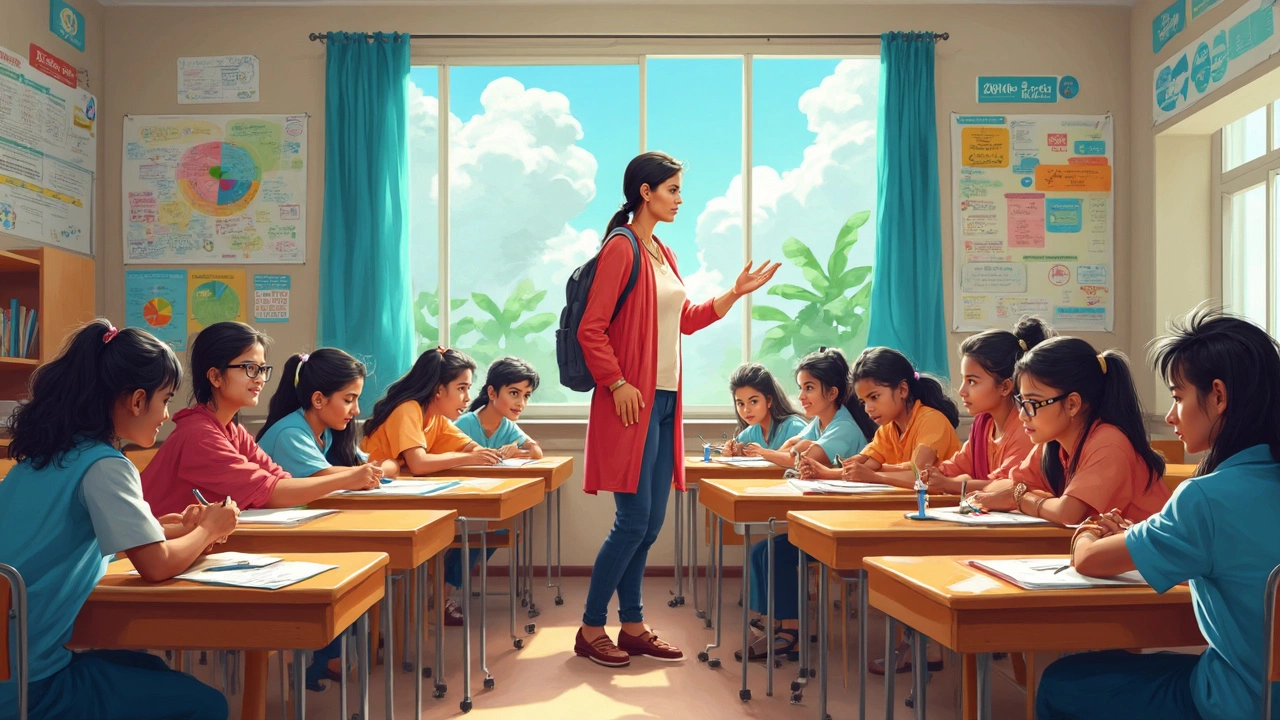In India, completing the 12th class marks the end of higher secondary education. It's commonly known as the Senior Secondary Certificate, but you might hear people calling it different names depending on the educational board your school follows. For those enrolled in CBSE schools, it's the All India Senior School Certificate Examination (AISSCE), which sounds fancy but essentially means you've wrapped up school-level education and can get started on whatever's next—be it college, university, or other professional courses.
The CBSE syllabus is structured to give students a well-rounded education, emphasizing science, commerce, and humanities streams. It's known for its comprehensive curriculum, which is designed to prepare students for various entrance exams and university admissions. This might sound overwhelming at first, but having a clear understanding of what lies ahead can be a massive help for both students and parents.
One of the interesting facts is how the CBSE syllabus tends to align with many competitive exams like the IIT-JEE and NEET, giving students a small head start if they're aiming for prestigious colleges in India. This synergy between secondary education and higher education entrance requirements can't be understated.
- What is the 12th Class Degree Called?
- The CBSE Syllabus Explained
- How it Compares to Other Boards
- Opportunities After 12th Class
- Tips for Students and Parents
What is the 12th Class Degree Called?
In India, the completion of the 12th class degree is an important educational milestone. Depending on the board, the name might vary, but the essence remains the same. For students under the CBSE syllabus, it's officially known as the All India Senior School Certificate Examination, or AISSCE. Yep, it's a mouthful but it's recognized nationwide.
Apart from CBSE, there are state boards and other national boards like ICSE that have their own names for the 12th class degree. For example, many state boards simply call it the Higher Secondary Certificate (HSC). Though the nomenclature is different, the degree holds the same weight when it comes to pursuing higher education or job opportunities.
What's fascinating about this stage is how it's a gateway to different career paths. After securing the 12th class degree, students can move on to colleges and universities that offer undergraduate programs. They can pick from varied streams like arts, science, commerce, and more. The choice largely depends on their interests and career goals, set against the backdrop of the education received so far.
Since the 12th class degree is a baseline qualification for many entrance exams and vocational courses, understanding its value is important. Universities and colleges look at these exams seriously, so prepping for and doing well in your 12th can help kickstart your future educational or professional journey.
The CBSE Syllabus Explained
So, you're probably wondering what's the big deal about the CBSE syllabus. Well, it's structured to provide a balanced education that prepares students for the real world. It's divided mainly into three streams: Science, Commerce, and Humanities, each with core subjects that lay a strong foundation.
The Streams Made Simple
Let's break them down:
- Science Stream: This is where you'll dive into subjects like Physics, Chemistry, and Biology. It's ideal if you're aiming for medical or engineering fields. Math is usually part of this, and let's face it, it's intense but essential.
- Commerce Stream: It's all about accounting, business studies, and economics. If you're eyeing a future in business, finance, or management, this is your go-to.
- Humanities Stream: This is where arts, history, political science, and psychology come into play. It's perfect if you're interested in social sciences or creative fields.
Key Features of the CBSE Curriculum
The CBSE curriculum focuses on a student-friendly teaching approach and frequent updates to keep the content relevant. Moreover, it's recognized across India, making it a solid foundation for higher studies.
A cool fact is that the CBSE board enhances practical and theoretical learning. They have practical exams, especially in science subjects, which sound nerve-wracking but are great for hands-on experience.
Assessment and Exams
Exams under the CBSE syllabus are often seen as stepping stones to competitive entrance exams. Throughout the year, students experience periodic tests, mid-terms, and final exams, which ensures they're always ready for whatever comes next.
Some of the popular exams students prepare for include IIT-JEE for engineering aspirants and NEET for those looking to enter medical fields. These exams align well with the CBSE's focus areas, giving students a smoother transition into college entry processes.
| Stream | Core Subjects |
|---|---|
| Science | Physics, Chemistry, Biology, Math |
| Commerce | Business Studies, Accounting, Economics |
| Humanities | History, Political Science, Psychology |
Understanding this structure and what the 12th class offers means you're already ahead in planning your educational journey. It might seem like a lot to take in, but with determination, the CBSE syllabus can be your best friend on the path to success.

How it Compares to Other Boards
India's education system is diverse, and the 12th class degree varies across different educational boards. When comparing the Central Board of Secondary Education (CBSE) with others like the Indian Certificate of Secondary Education (ICSE) and various state boards, several differences stand out.
The CBSE Advantage
The CBSE syllabus is often seen as more streamlined and focuses heavily on subjects like Mathematics and Science. It's designed to prepare students better for national-level competitive exams such as IIT-JEE and NEET. As a result, it's a preferred choice for many students aiming for careers in science and technology.
A teacher from Delhi Public School noted,
'CBSE prepares students to think analytically, which gives them an edge in competitive exams.'This speaks to the emphasis the board places on applying knowledge rather than rote learning.
ICSE and Broader Subject Choices
On the other hand, the ICSE board is known for its detailed curriculum and broader subject offerings, including a strong emphasis on languages, arts, and practical projects. This could be appealing for students interested in fields outside of Science and Engineering, such as Literature or Social Sciences.
State Boards and Varied Emphasis
State boards, meanwhile, can have different emphases depending on local educational needs and priorities. These boards might provide education in regional languages and often include local culture and history in the curriculum, making them unique in their approach.
| Board | Strength |
|---|---|
| CBSE | National competitive exams |
| ICSE | Comprehensive subject range |
| State Boards | Local culture and languages |
Choosing the right board isn't just about what you study, but how you prefer to learn. If competitive exams and a technological career path are your goals, CBSE might work best. However, if you're aiming for fields requiring strong communication and analytical skills, ICSE might be preferable. Understanding these differences can significantly influence a student's educational journey and career path.
Opportunities After 12th Class
So, you've made it through the 12th class in India—congratulations! Now, here comes the big question: what's next? Fortunately, you've got plenty of opportunities ahead of you, whether you're inclined towards academics, professional courses, or even hands-on trades. Let's break it down.
Higher Education Pathways
If you're sticking to the academic route, the most popular option is enrolling in a university for a bachelor’s degree. Depending on your stream, you can go for courses like B.Tech for Science, B.Com for Commerce, or a Bachelor of Arts for Humanities. Universities often have specific admission criteria based on 12th class marks and entrance tests, so it’s worth checking the details early.
Professional Courses
Not everyone is itching for college life, and that's perfectly fine! Consider professional courses that offer industry-specific skills. Engineering, Medicine, Law, and Management are biggies here, but there are others too like Fashion Design, Hotel Management, or even Animation and Design. These often require specialized entrance exams, so keeping an eye on application dates is key.
Exams and Entrance Tests
It's no secret that exams play a huge role in the transition after the Senior Secondary Certificate. Exams like IIT-JEE, NEET, and CLAT can be crucial for getting into top-tier programs. This means you'll need to steer your prep accordingly, maybe even look into coaching classes if you think that'll help you snag that coveted spot.
Alternative Pathways
Sometimes the road less taken can be rewarding too. Vocational courses in fields like IT, Healthcare, and Automotive Technology offer quick entry into the job market. Many are government-certified and highly valued by employers. Plus, starting salaries can be quite competitive!
Entrepreneurship and Work
If you're feeling like taking the plunge into the working world or have a knack for business, you might consider entrepreneurship or even part-time work. This can provide useful experience and sometimes even spark new career interests. Remember, real-world exposure can be just as enlightening as classroom learning.
Here's a quick snapshot of some common routes after 12th class:
| Stream | Pathway |
|---|---|
| Science | Engineering, Medical, Research |
| Commerce | Chartered Accountancy, B.Com, Management |
| Arts | Humanities, Fine Arts, Journalism |
So, whatever your interest, remember that post-CBSE syllabus life in 12th grade is full of potential. Do your research, follow your passion, and good luck with whichever path you choose!

Tips for Students and Parents
Navigating the journey of higher secondary education can be daunting, but with the right tips, both students and parents can feel more at ease. Here are some practical pointers to help you make the most of this vital educational stage in India.
Understanding the Syllabus
First off, it's essential to get a good grip on the CBSE syllabus. The curriculum is designed to cover a broad range of subjects, but it can sometimes feel overwhelming. Create a study schedule that balances school, home study, and leisure time. Regular revision is key, especially for subjects you find challenging.
Engage with Teachers and Peers
Don't shy away from asking questions in class or seeking help when needed. Teachers are there to guide you, and sometimes peers can offer fresh explanations that click. Study groups can be a great way to explore subjects more deeply, make learning interactive, and even a bit fun.
Stay Organized
Keeping your study materials organized can save a lot of time. Use folders, highlighters, and sticky notes to mark important areas. An organized study space means fewer distractions and higher productivity.
Explore Opportunities Beyond Academics
While academics are crucial, extracurricular activities can significantly enrich your school experience. They teach valuable lessons in teamwork, leadership, and help boost your resume when applying for college.
Parental Support is Vital
For parents, offering emotional support can make a world of difference. Encourage your kids, help them set realistic goals, and be patient during stressed-out times, especially around exam season.
Stay Informed and Make Informed Decisions
Keep an eye on upcoming college events or career counseling sessions. Often schools will organize workshops about next steps post-12th class, which can be incredibly beneficial.
Stay Healthy
Amidst juggling academics and extracurriculars, maintaining health is crucial. A balanced diet, regular exercise, and adequate sleep will not only improve productivity but also mental well-being.
